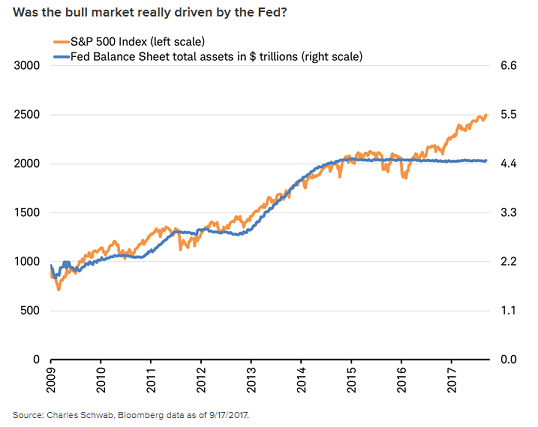

Stock market investors have always kept an eye on the world’s major central banks including the U.S. Federal Reserve (Fed), European Central Bank (ECB), and the Bank of Japan (BOJ), but since the financial crisis it has become almost an obsession. Central banks are often credited or blamed for the daily moves in the stock market as data is analyzed for how it may be interpreted by the world’s monetary policymakers. Even the longer-term trend in the stock market is often credited to central banks as seen in the chart below showing the growth in the Fed’s balance sheet and the U.S. stock market since the financial crisis.
Now that the Fed is set to trim its balance sheet for the first time, and the ECB is expected to taper their asset purchases next year, are stocks set to reverse all of their gains? We don’t think so. While it appears the Fed’s quantitative easing (QE) program that inflated their balance sheet also inflated the stock market, that association ended about a year ago as earnings lifted stock prices while the Fed’s balance sheet growth stalled. This divergence reveals that it is more likely to have been the rise in earnings, rather than Fed easing, that supported the rise in stocks.
What does that mean? It means the Fed policy of quantitative easing has taken root. There are still headwinds but the market is doing well on its own and that is a good thing.
Other items to watch;
Tuesday in his UN Speech, Donald Trump outlined his case against Kim Jon-Un, sparking a kind of tit for tat exchange between the two and escalating tensions.
John Park, a specialist on Northeast Asia at Harvard’s Kennedy School, said the tit-for-tat insults have created a “new reality” and probably have shut off any chance of starting talks to curb North Korea’s fast-growing nuclear arms program.
“If the belief centers around sanctions being the last hope to averting war and getting North Korea back to the negotiating table, it’s too late,” Park said.
“Adios Puerto Rico” said Maria
Hurricane Maria was the second blow in a 1 -2 punch on the island. Knocking down power lines and destroying infrastructure that was already weakened by Irma. The island expects that the ‘most devastating storm in modern history’ will change life on the island for months and years to come. Almost 70 percent of buildings on the island have been damaged or destroyed.
What does that mean? Puerto Rico really only has one source of revenue, Tourism. Puerto Rico with no power, deeply in debt and now no source of income is in serious trouble, and will be for a long time.
Another vote today 9/25 on Health care reform, what does that mean?
Sen. John McCain announced Friday in a statement that he cannot “in good conscience” vote for the GOP’s latest plan to overhaul Obamacare, likely ending Republicans’ latest effort to repeal and replace the Affordable Care Act.
“I cannot in good conscience vote for the Graham-Cassidy proposal,” the Arizona Republican said in a statement. “I believe we could do better working together, Republicans and Democrats, and have not yet really tried. Nor could I support it without knowing how much it will cost, how it will (affect) insurance premiums, and how many people will be helped or hurt by it. Without a full CBO score, which won’t be available by the end of the month, we won’t have reliable answers to any of those questions.”
McCain’s “no” vote means it is likely Republicans won’t be able to repeal and replace Obamacare before September 30.